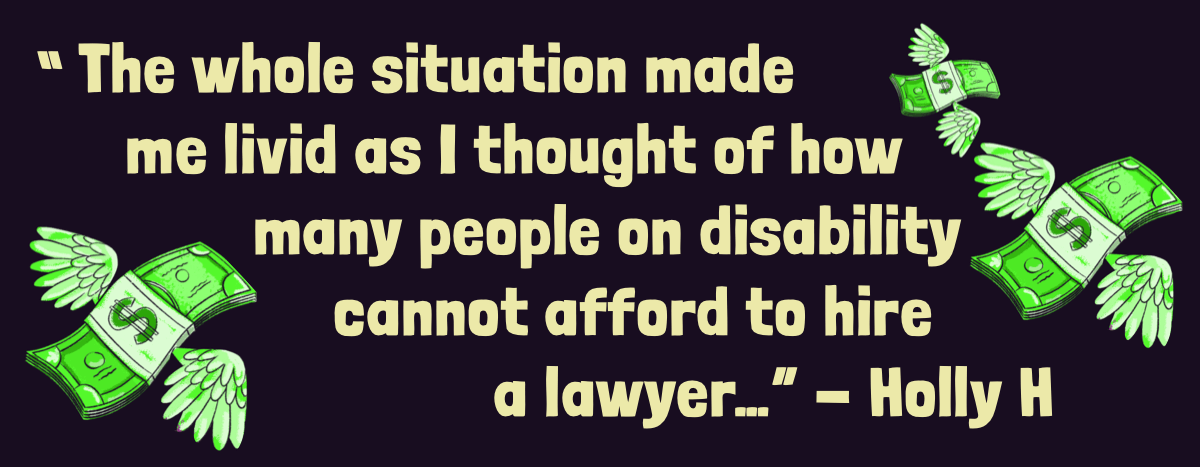Kicked Off Disability? What Are Your Options?
Holly was recently kicked off her private disability plan. After a year, she won back coverage. In this series, she walks us through the various steps she took and what it was like to navigate this experience.
After my private disability insurer required an evaluation by an "independent doctor” and then had me surveilled by a private investigator, I was notified that I’d been kicked off disability coverage. My coverage ceased immediately without any other notice.
The notification letter explained I could appeal the decision within 180 days.
Should I appeal on my own or hire a lawyer?
While it is possible to file an appeal on one's own, my doctor said I had better odds of winning if I hired a lawyer because they’d take me more seriously. He explained that if I appealed the decision on my own, I may be more likely to lose my benefits permanently. He said hiring a lawyer who specializes in disability cases is more capable of compiling an informed comprehensive appeal than I, as a layperson, could handle myself.
What did I decide?
Given my doctor’s encouragement based on his experience with these types of cases, I chose to hire a lawyer. But finding the right lawyer was another question altogether.
How did I find the right lawyer?
Finding a lawyer who specializes in private disability was hard. Most disability attorneys specialize in Social Security claims. Private disability is a different ballgame with its own set of rules and requirements. I did a comprehensive search but could only find two attorneys who specialized in private disability. One was local, and the other was across the country from me.
After meeting with both attorneys, I hired the across-the-country lawyer, who seemed to have more experience with migraine and claimed he had won a case against my insurance company in the past.
How could I pay for a lawyer?
Choosing to hire a lawyer for this type of case is very pricey and such a gamble. There are two options to choose from: a flat rate or a contingency agreement.
What is a flat rate fee?
A flat rate means that a one-time fee is paid, which can be extremely expensive. Half the fee initially secures the lawyer, and the other half is due when the case is filed. This option can be a huge risk because if the case is lost, those funds are gone.
What is a contingency agreement?
The contingency option means entering into an agreement with the lawyer. If the case is lost, then I owe nothing. If the case is won, the lawyer receives a substantial percentage of your winnings, which can be paid out of your benefits for the remainder of the payout.
What do some lawyers offer?
Some lawyers offer a combination of these options where a significant non-refundable deposit is paid, and in exchange, the contingency percentage decreases.
How much would either option cost?
Deciding which way to pay the lawyer was incredibly hard. I had to carefully calculate how much my lawyer would receive through a long-term contingency payout and then compare that with the flat rate fee. These numbers will vary for different people, of course. If you receive a somewhat healthy monthly payment, it may make better sense to fork over the flat rate. For many, however, there is no option but to enter into a contingency agreement as many of us do not have money saved to afford a flat fee.
What about those who can’t afford it?
The whole situation made me livid as I thought of how many people on disability cannot afford to hire a lawyer at all, much less pay thousands of dollars in fees. Most people receiving disability benefits are struggling to make ends meet. Giving away a percentage of benefits in perpetuity is hard to swallow. As a result, people may choose to appeal on their own.
What did my lawyer tell me to expect?
My lawyer told me to prepare for an exhaustive year. I’d have to meet with multiple evaluators, gather as many letters of support as possible, keep an extensive migraine diary, gather years of files, and get by with half of my normal income.
How do the potential outcomes factor in?
My lawyer explained that if I lost the appeal, I would have to decide if I wanted to continue pursuing the case. We would then file a legal case against the insurance company, which would mean more in-depth preparations and likely cost me another year. It also means I would have to enter into another financial agreement with my lawyer (flat rate or contingency).
Alternatively, I could win the appeal outright and get my coverage restored.
The insurance company could also offer a settlement for some percentage of what I would’ve been paid had I continued to receive coverage.
Which outcome is most common?
My lawyer explained that the last scenario is the most common. One benefit of pursuing the case after losing an appeal is that lawyer fees could be awarded as part of the settlement. This is not an option during the appeals process.
What did I decide?
Facing these difficult decisions, I met with my family to brainstorm options. Being kicked off of coverage was such a shocking turn of events and brought me to my knees with fear. There is a reason I’m on disability, after all. My migraine condition prevents me from working a full-time job.
We discussed the worst-case scenario: What if I lost coverage permanently? Would I need to sell my house and move in with one of them? Could I survive financially during the appeal and/or continuing litigation process?
We agreed as a group that my case was strong and worth pursuing to the best of my abilities. I am blessed to have a solid circle of support to help me address these questions.
With the encouragement of my family, I decided to pay the lawyer the flat fee and, if I lost the appeal, to continue litigation with a contingency agreement.

Join the conversation